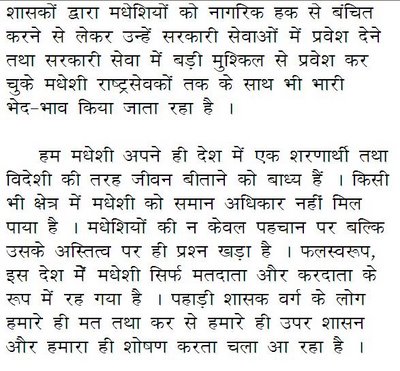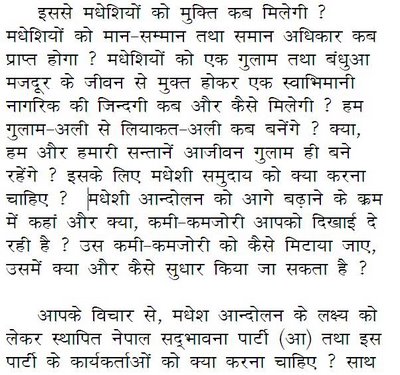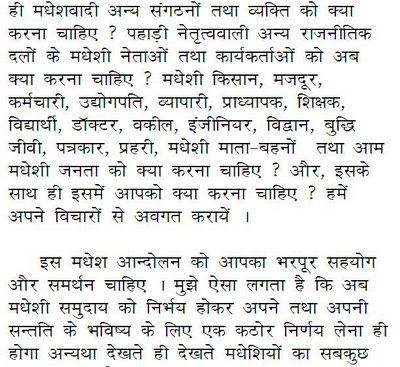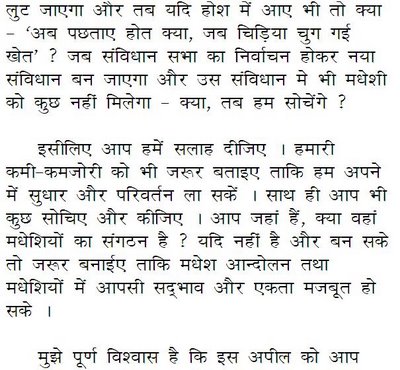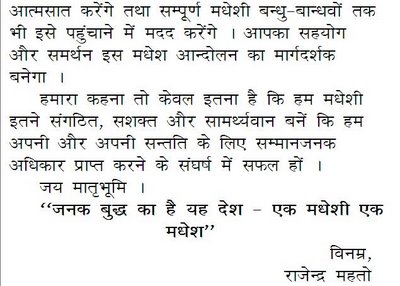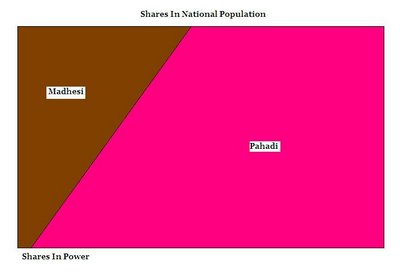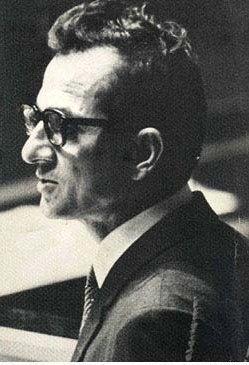
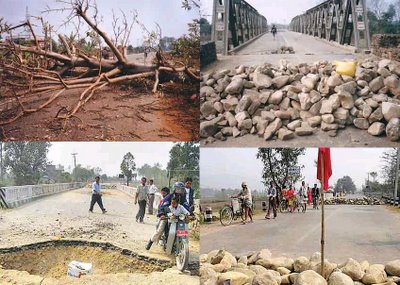
This has to be done now. This decision has to be immediate. It is as urgent as was the decision to rename the Nepal government, and the state army. This east west highway is the backbone of the national economy. It can not stay named after someone who imposed half a century of darkness upon the country. It is a shame this highway has not been renamed yet.
I struggled with the BP name. I thought perhaps it might come across as if the Nepali Congress will benefit from it in a partisan manner. But I no longer feel that. I think BP belongs to the nation at large, and not just to one political party. BP Koirala shines as a name in the democracy struggle of the Global South at large.
Phone Talk With Girija Koirala: Meeting History Itself
BP Koirala: Hoping Against Hope At Sundarijal
Mahendra is a villain, plain and simple. The Panchayati propaganda has to go down the drain. Nepal's history has to be rewritten in its proper democratic light.
BP Koirala was for a republic, he was for land reform. Interestingly that was also true for Madan Bhandari. BP Koirala's later move towards a constitutional monarchy was a tactical move aligned to then cold war realities. He would not have held to that today.
BP Koirala's towering presence in Nepal's democracy struggle is unmistaken. And that has to be honored. He was really something.
Time will come to name other landmarks after the likes of Madan Bhandari and Gajendra Narayan Singh.
Girija Koirala: Nepal's First President?
There is a strong chance that could happen. Heck, it could happen right now. If not, the first day of the first session of the constituent assembly will declare Nepal a republic, and if the Congress unifies now, it is likely to do well enough that Girija gets to head also the all party government born out of that new assembly.
On The Web
About BP Koirala
About B. P. Koirala
B.P. KOIRALA (The story of Bisheshor Prasad Koirala) : PRESENTED ...
bp koirala institute of health sciences dharan
The Hindu : Permanent rebellion: The story of B.P. Koirala The memoirs that rationalise the most, further notes Maurois, are those written by military men and politicians. The General's victories in his re-telling owe nothing to accident and impulse, or luck: they are the product of planning and tactical skill alone. The Prime Minister's policies owe nothing to expediency or compromise; they are made exclusively on the basis of ideology and principle. ..... The autobiography of the Nepali politician and sometime Prime Minister B.P. Koirala stands as a stunning exception to the rule. This is a remarkable document of personal and social history, a vivid account of exile and rebellion that provides acute insights into the history and politics of the 20th Century. ....... Born in 1914, B.P. was the son of Krishna Prasad Koirala, a poet, businessman and reformer who fought and made up - and then fought again - with the Rana rulers of Nepal. Krishna Prasad helped establish the town of Biratnagar in the Terai, where he made his money running a series of customs posts. ....... B.P. grew up in the India of the 1920s, a place and time with a plenitude of political choices. There was Gandhi, and there was Lenin. And there was Attaturk, an appealing model for rationalists seeking to rid their own society of tradition and custom. ............... Koirala chose Gandhi. After hearing the Mahatma speak he told his father he would now join an ashram school. The patriarch encouraged him, for he believed that the Indian National Movement "was also our movement because the autocracy of the Ranas was supported by British imperialists". The boy, meanwhile, was soaking in the progressive writing of the Indo-Gangetic plain. He read Maithili Sharan Gupt and Jai Shanker Prasad, and above all, Premchand. Indeed, it was in Premchand's journal Hans that B.P. made his literary debut. ......... The son stayed on in India, and turned leftwards. He read Marx, listened to Radio Moscow, and hung about with the communists. ...... Koirala was impressed by Marxist theory, but less so by Communist politics. He could not accept the Communist Party of India's view that the national movement "was nothing, that it was being masterminded by the British themselves, and that Gandhi was an unknowing agent of the British." ......... It was at about this time that the Nepali radical made the acquaintance of that other oscillator between Gandhi and Marx, Jayaprakash Narayan. "I was greatly impressed by him," writes Koirala: "he did not use sophisticated language and exhibited a simple personality." B.P. also befriended Acharya Narendra Dev and Ram Manohar Lohia. He was studying at the Banaras Hindu University (BHU), a hotbed of the Congress Socialists. Like them, and like Jawaharlal Nehru, he thought of going to Spain to fight on the Republican side in the civil war. ............. he got caught up in the Quit India movement ..... He was now lodged in Bankipur Jail, where one of his colleagues was Dr. Rajendra Prasad. They engaged in friendly but vigorous debate; Rajen babu on the side of spiritualism, the Nepali on behalf of scientific socialism. ....... "the salvation of the Nepalese lies in struggle", that "to hope for reforms from the Ranas is like hoping for milk from a dry cow". ....... On January 25, 1947, these men established the Nepali National Congress, with the help of funds from a handful of disgruntled Ranas. In March of that year, B.P's younger brother Girija Prasad helped instigate a strike of jute mill workers in Biratnagar. B.P. crossed over to help. He was arrested, and taken with his fellow agitators to Kathmandu, a long, slow walk across the hills. It took three weeks to get to the capital, the prisoners' march attracting much attention and helping to radicalise the peasants whose villages lay en route........... The Koiralas were kept in a Kathmandu bungalow. Letters to the Rana Prime Minister by Gandhi, Rajendra Prasad and others helped bring about an early release. B.P. went back to India, and began looking for arms to storm Kathmandu. ....... "from the radio of a cigarette and paan vendor nearby I heard the news - Gandhi has died." ... B.P. came back to his boarding house and wept through the night in remorse. ....... words of Ho Chi Minh: "Whatever may be my disagreements with Gandhi, we are all his products. Wherever there is a struggle, he has given his support and moral leadership. Even as someone who believes in violence, I can say that we are all his progeny." .......... in 1948 B.P. entered Kathmandu himself, disguised as a pandit. ....... A band of Nepali Congressmen stormed a treasury in Birganj. A tractor dressed up as a tank - by covering its sides with metal sheets - forced its way into the governor's garrison in the key town of Biratnagar. ...... B.P. was Home Minister, but had to resign after his policemen fired on a students' demonstration. ........ A revealing aspect of these memoirs is the bitter rivalry between the Koirala brothers. One was cautious, the other hot-headed. One was a moderate monarchist, the other a republican. Their disagreements were political and they were personal. B.P. even alleges that his brother once tried to bump him off. Jayaprakash Narayan tried, without success, to effect a reconciliation. Eventually the Nepali Congress split into two parties, one for each brother........... Mahendra was resentful of Koirala's popularity within and (especially) outside Nepal. ...... Mahendra was being pushed by the landed aristocracy to act before the Congress put in place radical land reforms. ...... While his brother was in jail, Matrika Prasad went off as King Mahendra's Ambassador to the United States. His family was fearful that B.P. would be bumped off, thus to meet the fate of the independent-minded Prime Minister of the Congo, Patrice Lumumba. Jawaharlal Nehru sent a message of reassurance through Koirala's sister. Nehru's "level of personal interest," remarks B.P. was "a source of great and reliable moral support for us prisoners who were so suddenly isolated." ........ hero and builder of modern Nepal: B.P. Koirala. ..... The eight years in Sundarijal jail are quickly glossed over. ........ Koirala's later life which, as always, was chockful of incident and controversy. ....... Exiled once more to India, he prepared his comrades in the Nepali Congress for a fresh round of armed struggle. Thirty-five of his young followers perished in one encounter, wiped out by the Nepali army while taking shelter in a cave. In 1976, Koirala himself returned to his country, sensing perhaps that he had not long to live. He was immediately arrested, and made a remarkable speech at his trial where he defended armed rebellion. ........ He struck close friendships with Indian politicians. Jayaprakash Narayan and Jawaharlal Nehru were to him like big brothers. But after his return to Nepal, India itself reappeared as Big Brother. As Home Minister and Prime Minister, writes Koirala, he had to fight against three forces: the royal palace, the land- holding elite, and India. Nehru might have been kind and polite, but his government deeply resented Koirala's independent foreign policy. The Indian ambassador in Kathmandu "believed that he was even greater than the King". ........ the fragility of Nepal's democracy ...... (The rise of the Maoists is a consequence of the failures of previous regimes to more effectively carry out the land reforms that Koirala had called for.) ....... one who was caught, on the right side, in the great (and unfinished) battle of the modern world, that between autocracy and democracy. ....... B.P. was one of his country's finest writers as well as its most prominent political rebel. ..... remarks on Kathmandu's intellectuals: "They love to highlight unimportant matters ... They are big on discussion, but do not give a paisa of support". And again: "Whoever came (to India) from Kathmandu in those days used to arrive with a great air of mystery, as if they alone were carrying the heavy burden of revolution." ......... Exile, jail, exile again; life underground and life as the Prime Minister of his people: only Nelson Mandela among modern statesmen could so completely have known the highs and the lows of politics. ....... B.P. provides a superb, if chilling, description of the lifestyle of those celebrated fighters for the world's poor, the Chinese Communists. In Beijing, Mao Zedong and Chou En-Lai stayed in lakeside palaces in the former emperor's grounds, their dwellings marked by great marble staircases and wall-to-wall carpeting. "The grandeur amidst which the Chinese leaders were living", remarks Koirala, "could not have been matched by any ruler of a capitalist state". ...... Reading B.P. Koirala's memoirs, I was struck by the parallels between his life and Nehru's. Both were democratic socialists who learnt much from Gandhi and a little from Marx. Both had fathers who were strong-minded and authoritative, self-made men who made a great deal of money and had a political orientation besides. The sons both became traitors to their class. Their own political choices exposed them to poverty and oppression. Nonetheless, both enjoyed the ceremony of power: the bowing and scraping at state visits and the meetings at the U.N.. Both were truly charismatic figures who towered over their colleagues. B.P's description of the 1959 elections in this book recalls the role played by Nehru in the Indian elections of 1952. Victory for the party candidate was assured only after Koirala or Nehru had descended from the air to speak. Each constituency had, so to say, to be sanctified by a speech by the Great Leader. Their names got their party into power, but once in office, both were hemmed in by more cautious men on their own side. The programmes of economic and social justice that they were in principle committed to never seriously took effect. (Nehru might well have written, as Koirala does here, that "real and effective support I did not get from my own party".) And in either case, politics became a kind of family business: Nehru's daughter and grandson, and Koirala's elder and younger brother, also held office as Prime Minister of their country.
BIOGRAPHY OF B.P. KOIRALA
Himal Books - B.P. Koirala’s Atmabrittanta
Koirala family - Wikipedia, the free encyclopedia
Home | Asia | Nepal | BP Koirala memorial cancer hospital -IAHPC ...
Girija Prasad Koirala - Wikipedia, the free encyclopedia
B.P. Koirala Institute of Medical Sciences
Kiran Mishra - BP KOIRALA: Life and Times
BP Koirala - Nepali Times
Democracy For Nepal (DFN): Phone Talk With Girija Koirala: Meeting ...
In The News
Martin rushes to India, acquires Delhi's view on Nepal's arms mgmt Kantipur
Nepal loses UNSC bid to Indonesia
FNCCI defy court order, go ahead with nationwide strike
Govt, rebels consult UN team on arms
Maoists threaten journalists, rights activists
Delay in interim statute may affect CA poll: EC
50-yr-old tortured
Rs 3.6m robbed in capital
Martin meets PM, Prachanda
राजालाई सम्पत्तिविहीन बनाउने कांग्रेस निर्णय स्वर्गीय राजा वीरेन्द्रको सम्पूर्ण सम्पत्तिको एउटा कोष बनाउनुपर्ने र राजदरबारको परम्परागत सम्पत्तिलाई राष्ट्रियकरण गर्नुपर्ने ठहर ..... राजतन्त्रको भविष्य संविधानसभाको पहिलो निर्णयबाट टुंगो लगाउने अडान आठ दलको वार्तामा राख्ने ..... हतियार व्यवस्थापनलाई वार्ताको केन्द्रबिन्दु बनाउने ..... राज्यको हतियार 'तटस्थ' र माओवादी हतियार 'पूर्ण व्यवस्थापन' भएपछि मात्र जनताको लोकतान्त्रिक अभ्यास र संविधानसभा चुनावका लागि भयरहित वातावरण बन्ने अडान कांग्रेसको छ । ..... सरकार र माओवादीबीच सहमति र समझदारी हुँदै जाने तर कार्यान्वयन नहुने प्रवृत्ति
'अन्तरिम संविधानपछि मात्रै निर्वाचनको बाटो'
राजमार्ग कब्जामा
वाममोर्चा मन्त्रीलाई फिर्ता बोलाउने पक्षमा
राजपरिवारको जग्गामा हदबन्दी
वार्तासँगै पुनर्निर्माणमा जोड दिनुपर्छ ः कुलचन्द्र
माओवादी र प्रेस
शान्ति वार्तामा राजतन्त्रको विवाद सिंगो मुलुक संविधानसभामय बनेको त छ तर त्यसको स्वच्छता, निष्पक्षता र सुनिश्चितता हतियार व्यवस्थापनमै गाँसिएको छ । ....... राजतन्त्र उन्मूलन गर्ने दलहरूको साझा सहमति बन्नासाथ माओवादी नेतृत्व हतियार व्यवस्थापन गर्न सहजै तयार देखिन्छ । ....... सात दलका अधिकांश घटक संविधानसभाको चुनावसम्म सेरेमोनियल मोनार्की राख्न तयार रहेको देखिन्छ । माओवादीसमेत संविधानसभा चुनावसम्म राजतन्त्र राख्न तयार भएको त छ तर निलम्बित अवस्थामा । ....... 'सेरेमोनियल मोनार्की' लाई अन्तरिम अवधिका लागि स्वीकार गरेको देखिन्छ । ...... केही प्रमुख दलहरूले गणतन्त्रको औचित्य आत्मसात गरिसकेका छन् । ...... मुलुकमा सक्रिय राजतन्त्रको अवशेष बाँकी नै छ । ....... शीर्ष बैठकमा राजतन्त्रको विषय गरमागरम बहस र असहमतिकै प्रमुख बुँदा बन्न पुगेको छ ।
चन्दा आतंक रोक्न माग
मैले किसुनजीलाई भनेँ, तपाईंकहाँ आउन्न ः विमलेन्द्र निधि आफू पाँच वर्षको हुँदा जनकपुर विमानस्थलमा पिता स्व महेन्द्रनारायण निधि, जो त्यतिबेला उप-सभामुख हुनुहुन्थ्यो, पक्राउ परेपछि विमलेन्द्र निधिको मनमा गढ्यो, राजा र यिनका सिपाहीलाई खत्तम गर्नुपर्छ । ...... ०३६ सालमा सम्पन्न नेपाल विद्यार्थी सङ्घको महाधिवेशनमा अध्यक्ष चुनिएका ....... अख्तियारले डामेका केही व्यक्ति आफूलाई शुद्ध देखाउन पार्टी एकीकरणको स्वाङ रचिरहेका छन् । ... तिनीहरू आन्दोलनको पनि विरोध गररिहेका थिए । न तिनसँग एकीकरणका लागि चाहिने कुनै एजेण्डा छन््, न कुनै गृहकार्य नै । ..... नेपाली काङ्ग्रेसले आफ्नो उद्देश्यमा निहित राष्ट्रियता, प्रजातन्त्र र समाजवादमध्ये समाजवादलाई झिकेर विकास र शान्ति थपेको छ । ..... खोइ त वार्ताको गृहकार्य ? ..... प्रजातान्त्रिकले भनेको छ, सङ्घीय लोकतान्त्रिक राज्यको निर्माण, राजतन्त्र अपरहिार्य नहुनु, समावेशीकरणका आधारमा राज्यको पुनःसंरचना, कदमजम -कणर्ाली, दलित, महिला, जनजाति, मधेशी) को व्याख्या । यी यस्ता कुरामा दुवै पार्टीको एकै धारणा बन्नु जरुरी छ । साथै, पार्टीको आन्तरकि लोकतान्त्रीकरण पनि आवश्यक छ । ...... जब केपी -कृष्णप्रसाद) बाट जीपी -गिरजिाप्रसाद) मा नेपाली काङ्ग्रेसको नेतृत्व गयो, तब पार्टीको गतिविधि संस्थागत रूपमा केन्द्रीकृत भयो । जिविसको सभापति-उपसभापति, मेयर-उपमेयरको टिकट दिने काम पनि केन्द्रले गर्न थाल्यो । ...... पछिल्लो संसदीय निर्वाचनका लागि २२ वटा क्षेत्रका उम्मेदवारको नाम संसदीय समितिले तय गरेकोमा त्यसलाई काटेर नयाँ नाम आयोगमा पठाउने काम सभापतिबाट भयो । ..... महेन्द्रनारायण निधि प्रतिष्ठानले पिताजीको निधनपछि वृत्तचित्र बनाउने निर्णय गर्यो । निश्चय नै यसमा किसुनजीको 'बाइट' राख्दा अर्थपूर्ण हुन्थ्यो । मैले किसुनजीलाई भनेँ । उहाँले सहर्ष स्वीकार्नुभयो । त्यसपछिका दिनमा उहाँकी निजी सहायक अमिता कपालीमार्फत बाइट दिन नसक्ने कुरो आयो । ....... अर्को एउटा प्रसङ्ग छ । पिपरा महोत्तरीमा रामनारायण मिश्रको प्रतिमा अनावरण गर्न किसुनजी, गिरजिाबाबु र शेरबहादुरलाई बोलाउने निर्णय भयो । आफ्ना राजनीतिक सखाको प्रतिमा अनावरण गर्न जान्छु भनेर फुरुङ्ग हुनुभा'थ्यो किसुनजी । उहाँको स्वास्थ्यलाई ख्याल गरेर हामीले हेलिकप्टर चार्टर गर्ने प्रबन्ध मिलाएका थियौँ । यसमा पनि उहाँकी सहायक बाधक बनिन् । यसपछि उहाँसँग मेरो भेट भएको थिएन । ...... यदि कोही भगवान्ले भक्तलाई अपहेलना गर्छ भने त्यो मन्दिरमा पुनः जाँदैन । म पनि तपाईंकहाँ आउन्न ।' यसपछि उहाँले भन्नुभो, 'ए बाबु, आइ टुक माई वर्ड ब्याक ।' ..... किसुनजी त डायरी लेख्नुहुन्छ । ..... नेपालमा राजतन्त्र चाहिन्छ भन्ने उहाँको धारणाप्रति मेरो सदैव असहमति छ । ...... लोकतन्त्रको दीर्घायुका लागि पनि पार्टी एकीकरण हुनु अपरहिार्य छ । ..... प्रजातान्त्रिकका सभापति शेरबहादुर देउवाले तीन सदस्यीय कार्यदल गठन गरेर तिनको नाम गिरजिाबाबुलाई दिएको महिना दिन भइसक्यो । ...... प्रजातान्त्रिक काङ्ग्रेस त पहिल्यै लोकतान्त्रिक गणतन्त्रको पक्षमा छ । मेरो विचारमा प्रायः सबै गणतन्त्रमा विश्वास राख्छन् । कोही व्यक्त गर्छन्, कोही अव्यक्त रहन्छन् । राज्यको पुनःसंरचनामा सहमत नभई त मिलनको कुरै छैन । काङ्ग्रेस यी विषयमा अड्क्यो भने प्रजातान्त्रिकलाई कमजोर बनाउन पार्टी जुटाउने स्वाङ गररिहेको छ भन्न कर लाग्छ ।...... राजनीतिमा लागेकाहरूका निम्ति विचार ठूलो कुरो हो । भीड केही होइन । विचारले भीड बढाउँछ भन्ने कुरो माओवादी पार्टीलाई हेरे पुग्छ । ...... वार्ता सफलताको चरणमा छ । .... माओवादीकै भनाइमा उनीहरूसँग जनयुद्ध थाल्दा न हतियार थियो, न त सङ्गठन । समयक्रममा उनीहरूको विचार यति सवल भएर आयो कि हतियार पनि प्रशस्त भो । जनआधार पनि त्यत्तिकै सवल भयो । आन्तरकि रूपमा लोकतान्त्रिक नभएका पार्टीहरूले अभ्यास गरेको प्रजातन्त्र धराशायी भयो । जनआन्दोलनमार्फत त्यसले पुनर्जीवन पाएको छ । मान्नुस् या नमान्नुस्, माओवादीको संलग्नताले यो सम्भव भएको हो । ...... मधेशी समुदायको नागरकिताको समस्या पनि अब समाधान हुनेछ । यसर्थ, म जुन पार्टीमा छु, त्यसैमा रहेर यी समस्या समाधान हुनेछन् । ..... चालू संसद्को विधेयकले धेरै कुरा समेटेको छैन । संविधानसभाका लागि मतदाता नामावली तयार हुनुभन्दा पहिल्यै सबै नेपाली नागरकिले नागरकिता पाउनुपर्छ । ..... नेपालीबाहेक अरूलाई नेपालको नागरकिता किन चाहिन्छ ? ... जो नागरकिताको प्रमाणपत्र नलिई यसै देशमा जन्मन्छ र मर्छ भने त्यसका बारेमा राज्यले सोच्नु पर्दैन ? सही व्यक्तिले नागरकिता पाओस् भनेर संयन्त्रको विकास गर्नु राज्यको दायित्व हो । तर, अरूले लिन्छन् भनेर पाउनुपर्नेलाई नदिइराख्न मिल्दैन ।
हतियार-गणतन्त्र साटासाट साढे चार वर्षको अवधिमा १३ औँ पटक प्रत्यक्ष भेटघाट गरसिकेका प्रधानमन्त्री गिरजिाप्रसाद कोइराला र माओवादी अध्यक्ष प्रचण्ड ...... सो बैठकमा प्रधानम्ान्त्रीले माओवादीसँग घुमाउरो पारामा जनयुद्धमा भएगरेका गल्तीबारे आत्मालोचना गर्दै नेपाली जनतासँग माफी माग्नुपर्ने शर्त राखेका थिए । त्यसपछि वार्ता झण्डै बिथोलिने अवस्थामा पुगेको थियो । ...... प्रचण्डले तीनबुँदे प्रस्ताव राखे, जुन यसप्रकार छ ः
१. दलहरूले नै अन्तरमि संविधान बनाऊन्, सरकार पनि दलहरूकै होस् । तर, हतियार नै मूल बाधक हो भन्ने कुरालाई धेरै जोड नदिउ“m । संविधानसभाको तिथि घोषणा होस् । पाँचबुँदे सहमतिअनुरूप दुवैतिरका सेनालाई संविधानसभाको चुनाव अवधिसम्म अनुगमन गर्न तयार छाँै । निष्पक्ष्ा चुनाव गराउने वातावरण तयार पारौँ । माओवादीलाई खुला प्रतिस्पर्धामा प्रचारप्रसार गर्ने वातावरण बनोस् ।
२. राज्यको पुनःसंरचना गर्ने सहमति भएमा माओवादी सरकारमा जान तयार छ । तर, त्यसका लागि सेनाको संरचनादेखि निर्वाचन प्रणालीसम्ममा सुधार आउनुपर्छ । त्यस अवस्थामा पनि माओवादीको हतियार राष्ट्रसङ्घकै सुपरीवेक्षणमा गरनिे कुरामा हाम्रो सहमति छ ।
३. यदि सात दल र माओवादी मिलेर संयुक्त गणतान्त्रिक मोर्चा बनाई संविधानसभामा जाने सहमति हुन्छ भने माओवादीका सबै हतियार 'लक' गर्न तयार छौँ ।
२६ गते बिहान १० बजे माओवादी नेताहरू प्रचण्ड, बाबुराम, बादल र महरासहित प्रधानमन्त्री गिरजिाप्रसाद कोइराला, एमाले महासचिव माधवकुमार नेपाल र पूर्वप्रधानमन्त्री शेरबहादुर देउवा करीब चार घण्टा छलफलमा बसे । ...... वास्तवमा, यस बैठकमा प्रधानमन्त्री कति भावुक भएर प्रस्तुत भए भने त्यसले वार्ताको वातावरण नै अर्कै बनाइदियो । स्रोतका अनुसार, प्रधानमन्त्री कोइरालाले प्रचण्डसँग संविधानसभाको चुनावभन्दा अघि राजाका सबै अधिकार कटौती गर्ने प्रतिबद्धता व्यक्त गरेका थिए । त्यसैगरी, स् वर्गवासी राजा वीरेन्द्रका सबै र राजा ज्ञानेन्द्रका केही उद्योगका लगानीहरू राष्ट्रियकरण गर्ने सहमति जनाएका थिए । ...... बालुवाटार बैठक सकिनासाथ उनले दुई दिनभित्र केन्द्रीय समितिको 'आकस्मिक बैठक' बोलाए । यति छोटो समयको अन्तरमा केन्द्रीय समितिको बैठक बोलाइएको माओवादीको १२ वर्षे इतिहासमा यो पहिलोपटक हो । ...... अन्तरमि व्यवस् थापिकाबारे माओवादीले यसअघि सार्दै आएको ३३ प्रतिशतको कुरामा पनि सम्झौता गर्ने भएका छन् । यसमा काङ्ग्रेस, एमाले र माओवादीको समानुपातिक सहभागिता रहने गरी अन्य दल एवम् नागरकि समाजलाई त्यही अनुपातमा मिलाउने गृहकार्य भइरहेको छ । ...... प्रचण्डका शब्दमा, "जनताले परविर्तन चाहिरहेका छन्, शान्तिको घोषणा सुन्न चाहेका छन्, त्यस्तो अवस्थामा फेर िअर्कोपल्ट माओवादीले हदै लचिलोपन अपनाएर शान्ति प्रक्रियामार्फत वार्ता सफल पार्न चाहन्छ ।" ...... सरकारभित्र रहेको सेना र 'ब्युरोक्रेसी' मा आफ्नो पकड जमाउन पनि माओवादीलाई सरकारमा जानु आवश्यक छ । तर, 'सरकारमा गएमा नेताहरू बद्नाम हुने र त्यसको दोष पूरै पार्टीलाई जान्छ' भन्नेहरूको पनि मत माओवादीमा प्रबल छ ।
बढ्दो छ राष्ट्रसङ्घको सक्रियता
सेलायो संसद्
ँशिखर वार्ता गाईजात्रा नबनोस्’
माओवादी अध्यक्ष प्रचण्डले असोज २२ गते हुने वार्ताप्रति आफू धेरै आशावादी नभएको बताउँदै नेपाल सँगको विशेष अन्तर्वार्तामा असहमतिका लागि वार्तामा बस्नुको कुनै तुक नभएको बताउनुभएको छ शाही संलग्नतामा खुलेर सञ्चालन भइरहेका उद्योगधन्दामध्ये सबभन्दा धेरै झापाको दमकस्थित हिमालय गुडरकि प्रालिले १४ हजार दुई सय ४३ रोपनी जग्गा ओगटेको छ । हिमालय चिया बगानको स्वामित्वमा जग्गाधनी श्रेस् ताले पाँच सय ७५ बिघा १७ कट्ठा १४ धुर मात्रै जग्गा रहेको देखाउँछ । तर, दमक नगरपालिकाका एक पूर्वजनप्रतिनिधिको दाबी छ, "उक्त कम्पनीले कूल एक हजार ५५ बिघा जग्गा ओगटेको छ ।" ....... हाल राजा ज्ञानेन्द्रकी छोरी पे्ररणाका नाममा गरएिको सोल्टी इन्टरप्राइजेज प्रालिका ४८.४७ प्रतिशत शेयर उक्त चिया बगानमा ०४७ फागुन ९ को अभिलेखले चाहिँ तत्कालीन अधिराजकुमार ज्ञानेन्द्रको एक सय १४, कोमलको ९३, धीरेन्द्रको ९४, पे्रक्षाको ९३ र पारसको नाममा ३० कित्ता शेयर रहेको देखाउँछ । मोठ नम्बर ५/९२२ मा १५ वटा कित्तामा सात हजार सात सय ६५ रोपनी जग्गा दर्ता अवस्थामा छ भने छ हजार चार सय ७८ रोपनी ऐलानी जग्गा उक्त कम्पनीले भोगचलन गररिहेको छ । ...... दरबारमार्गमा रहेको ४१ रोपनी जग्गा ०४३ असार २६ को निर्णयबाट होटल डेला अन्नपूर्णका नाममा दर्ता गरेको पाइएको छ । सोल्टी होटलका नाममा ८२ रोपनी जग्गा ताहाचल र पशुपतिमा रहेको छ । ...... उद्योगधन्दाका नाममा नेपालको पूर्वी तराईमा शाह र राणा परविारका कैयौँ व्यक्तिले यस ढङ्गले हजारौँ रोपनी जग्गा हदबन्दी छल्ने नियतका साथ सुरक्षित स्वामित्वमा राखेका छन् । ..... पूर्वसांसद रुद्रमणि शर्मा भण्डारीको अध्यक्षतामा गठित एक आयोगको प्रतिवेदनमा यस्ता जग्गाजमीनको आंशिक विवरण उल्लेख त गरएिको थियो । तर, उक्त प्रतिवेदन नै हाल भूमाफिया गिरोहले गायब पारसिकेको स्रोतहरूको दाबी छ । तत्कालीन भूमिसुुधारमन्त्री जगन्नाथ आचार्यले राजा, राजपरविारका सदस्य र ठूला उद्योगीले हदबन्दी छल्ने अभिप्रायले उद्योगका नाममा लुकाइराखेको जग्गा खोज्ने र खोस्ने कुरा बोलेबापत ०४८ सालमा मन्त्री पद नै गुमाउनुपरेको थियो । .......... काठमाडौँको गोकर्णमा राजा वीरेन्द्रका नाममा रहेको तीन हजार एक सय २३ रोपनी नौ आना पाँच पैसा दुई दाम जग्गामा हाल ला मेरेडियन होटल चलिरहेको छ ।
Nepal Army locks horns with UN rights group Hindustan Times, India
Nepal Needs Over $16b to Meet MDGs: Report Himalayan Times, Nepal
Nepal businesses close in strike against extortion Reuters AlertNet, UK
Martin, Tamrat Discuss Nepal Peace Process in India Himalayan Times, Nepal
Ian Martin discusses Nepal’s peace process with Indian officials
Alam reiterates Nepal’s commitment to combat terrorism Nepalnews.com, Nepal
Adhikari highlights the importance of ICT
Visitors
| 12:50 | Cegetel Entreprises, France |
| 12:55 | Columbia University, United States |
| 12:57 | OgerTel Enterprise Technologies, South Africa |
| 13:05 | Xspedius Management Co.,LLC., United States |
| 13:11 | State of New Jersey, United States |
| 13:11 | Bitmailer S.L, Spain |
| 13:20 | Iowa State University, Ames, United States |
| 13:34 | Hewlett-Packard Company, United States |
| 13:57 | China Netcom Corp. Ltd., China |
| 14:01 | Duke University, Durham, United States |
| 14:11 | University of Lancaster, Lancaster, United Kingdom |
| 14:56 | The Mayo Clinic, United States |
| 15:16 | WDR, Köln, Germany |
| 15:40 | AMD, United States |
| 16:39 | Telecommunications Services of Trinidad and Tobago, Trinidad And Tobago |
Alam reiterates Nepal’s commitment to combat terrorism
Lawmaker Aftab Alam, who is also a member of the Nepali delegation to the 61st session of the UN General Assembly, reiterated Nepal's commitment to combat terrorism from the world.
Participating on agenda item on Measures to Eliminate International Terrorism at the Sixth Committee of the General Assembly on Monday, he said, “While we discuss on how to prevent terrorism through legal ways and means that lay down normative foundation for international cooperation in combating terrorism, it is imperative to address the situation that harbour terrorism, including socio-economic backwardness, including poverty, illiteracy, violation of human rights and fundamental freedoms, suppression and extremism and intolerance that lead to violence and destruction of public property.
He further said that we must encourage dialogue and negotiations to resolve any disputes through peaceful means of settlement as envisaged in the Charter of the United Nations.
He stressed that democracy, the rule of law, human rights and freedom of people provide foundation for sustained peace and stability in the society.
He underlined the need for an agreement on a comprehensive convention on international terrorism that seriously threatened international peace and security.
Alam highlighted the adoption of both the international convention for the suppression of acts of nuclear terrorism and the international comprehensive strategy to combat terrorism by the General Assembly as a significant step forward.
He urged the international community to extend their financial and technical support in enhancing national capacity of member States.
Alam also underlined the need for a comprehensive legal framework strengthening the United Nations' efforts to deal with international terrorism more effectively and resolutely.
He called upon the international community to continue its cooperation for vigorous and concerted effort for combating such heinous crimes against peace, humanity and development.
